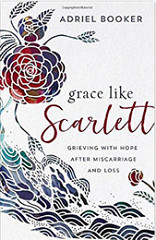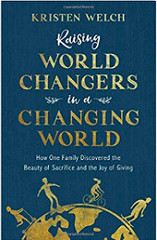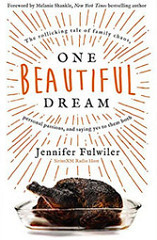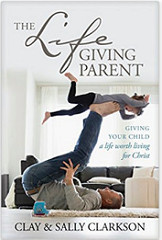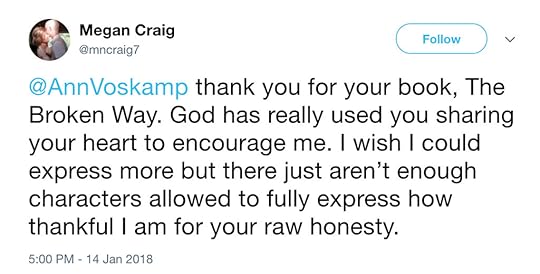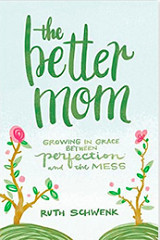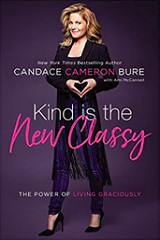Ann Voskamp's Blog, page 122
May 8, 2018
When Mother’s Day finds you in a hurting place
When Adriel Booker lost her daughter Scarlett to miscarriage, she was struck by the force of grief and learned the language of lament in ways she had never imagined. And yet, she discovered, though grief is wild like the sea, it doesn’t need to destroy us. We can’t conquer it, but we can navigate it, and we can find Jesus there too. With vulnerability and tenderness, Adriel shares her own experience of three consecutive miscarriages and a great many truths about suffering, grief, forgiveness, and hope in her book Grace Like Scarlett. I invite you to open your heart and welcome Adriel to the farm’s front porch today…
How does a mother learn to breathe again after her baby dies? One breath in. One breath out. And then again. And again.
I delivered two healthy sons before experiencing miscarriage—the deepest form of personal crisis I’ve yet endured, leaving me reeling and disoriented.
And then I experienced another. And another.
Suffering doesn’t choose the weak or the strong, the faithful or the faithless. It chooses the human.
When you’re caught by waves larger than your capacity to stay above the surface, you’ve got to allow your heart to feel the pain all the way down to the bottom, so that when you get there you can see you’re still alive.
There’s still hope.
It’s from the bottom we can begin to heal our way back up to the surface. The human heart is fragile, yes, but it’s also more resilient than we give ourselves credit for.
The deep is not our enemy or a thing to be resisted. But it does command our attention.
No matter what form it takes, suffering always commands our attention. It won’t be alleviated by comparison to greater or lesser suffering (or your perception of it).
Your pain is your pain and it deserves the dignity of recognition, for that is where healing begins.









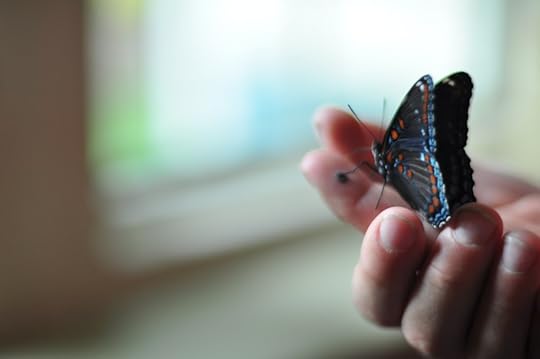
Naming our suffering doesn’t mean becoming defined by it; it means honestly acknowledging our need in the presence of Jesus.
Our humility frees us to receive His grace. It’s his beauty for our ashes—the great exchange, God’s answer to our pain.
Our present suffering is the best reminder that life gives us more than we can handle, which is exactly why we need Jesus.
After my first miscarriage when waves of grief came pounding with incredible force, I discovered something: If I didn’t dive deep, the waves would pummel me. In surfing, this is called a “duck dive.” The apostle Paul calls it being “hidden with Christ.”
I call it survival.
As I began to practice my own deep dive, I discovered it was more than survival. It was an invitation: Would I find Jesus in the deep?
My suffering became the invitation to experience God’s grace—His upside-down kingdom at work.
We named our baby Scarlett Grace.
Scarlett for the pain, the suffering, the life poured out mingled with the hope of resurrection.
Grace for possibility and purpose, goodness and life—the breathtaking assurance that God can be found in our suffering.
God’s promise to us is not that bad things won’t happen, it’s that He’s with us through it all—Emmanuel, God with us.
We were beginning to see it.
The ache we endured after losing Scarlett helped uncover holes in our theology—chiefly, that we didn’t have a theology of suffering.
A theology of suffering doesn’t mean God wills it or leads us into it.
It means that when suffering comes into our still-broken world—as it will—He can be found there too.
Theoretically we understood this, but our bewilderment in the face of bottomless pain confirmed our lack of praxis.
Simply put, we weren’t living what we believed because we’d never had the chance to.
Although God wasn’t the source of our suffering, we were beginning to learn that what the enemy of our souls used against us could be transformed by the redemptive hand of our wonder-working God as He reshaped our loss into an invitation to greater life.
We couldn’t discern it yet, but God was hovering, preparing to create something new like He always does when all we see is dark, formless, and void.
Scarlett took us deeper. But we had to be willing to disarm our knee-jerk instinct to distract, numb, or overcome our pain.
We had to resist the impulse to deflect our grief or fight our brokenness.
We had to reject the compulsion to figure out how this could be rewritten into a success story.
We had to enter in as is.
The spectacle of heaven is that it’s birthed into the low places.
It’s revealed when Jesus is allowed to enter into the lives of those who know their need for Him: a woman caught in adultery, a fraud and a cheat, a hotheaded loudmouth, a terrorist, a thief, a diseased outcast . . . a mother staring at an empty ultrasound screen.
Heaven is not merely a destination; it’s the Spirit of God writing a redemption story right here and now among our brokenness.
Trauma can be the birthplace of revelation if we’re willing to be exposed to our need and welcome Jesus there.
But it’s hard to be needy, isn’t it? We’re more comfortable being the helper than the helped.
We’d rather be the ones lowering our friend through the roof to Jesus than being so broken we’ve got to be carried there ourselves.
Choosing to walk in the way of vulnerability before God and others takes a certain kind of resolve.
It requires tapping into a different place than where we store our ability to grit our teeth and sidestep pain.
It looks less like scaling a mountain and more like crawling to an altar—laying ourselves bare before Jesus, weapons and defenses dropped, pride abandoned, hearts wide open asking for deliverance.
He sees our lack and names it Beautiful, and we’ve never felt more loved.
Can anything ever separate us from Christ’s love? Does it mean He no longer loves us if we have trouble or calamity? . . . I am convinced that nothing can ever separate us from God’s love. Neither death nor life, neither angels nor demons, neither our fears for today nor our worries about tomorrow—not even the powers of hellcan separate us from God’s love. (Rom. 8:35, 38 NLT)
In the face of suffering, Jesus stretches out His hand.
Will we accept the invitation to dive deep under the waves rather than try to tame or outrun them?
Will we understand we’re still loved?
Adriel Booker left the beautiful mountains of Oregon to serve in global missions as a speaker, writer, advocate, and mentor, and she continues in ministry today, nearly two decades later. She leads The Love A Mama Collective, a movement of women empowering women through safe birth initiatives in the developing world, and is the curator of Our Scarlett Stories, a community of parents supporting one another after pregnancy loss.
In her new book, Grace Like: Grieving with Hope after Miscarriage and Loss, Scarlett, Adriel tackles the complex questions about faith and suffering that arise after a miscarriage with sensitivity and clarity. She invites women who have gone through this devastating experience to a place of grace, honesty, and hope in the redemptive purposes of God without offering religious clichés and pat answers. She also shares specific, practical resources, such as ways to help guide children through grief, suggestions for memorializing your baby, and advice on pregnancy after loss, as well as a special section for dads and loved ones.
[ Our humble thanks to Baker for their partnership in today’s devotion ]

May 7, 2018
Either You Change the World or You let the World Change You: How to Change the World & Be Changed the Most
Kristen Welch, one of my closest friends and daily heart-sister, her and I share a friendship forged in brokenness. Back in 2010 when she first traveled to Kenya and I to Guatemala, little did we know how God would use those respective trips to break our hearts for the things that break His — and use those trips to bind our hearts to His and to each other’s. Since then Kristen has founded Mercy House Global, a ministry which transforms lives in Kenya in a multitude of ways—yet Kristen would be the first to tell you that perhaps the most significant transformation she has seen through it all has been in her own family. I absolutely could not love this woman more, hold her in the highest esteem possible and I’m thrilled to welcome this world-changer to the farm today . . .
I stretched out on the lush, green grass and let the sun warm me. July in Kenya is cold. I closed my eyes and took a deep breath.
I’m not sure how long I sat there, eyes closed, head tilted toward the African sky, listening to babies cooing and toddlers giggling around me. I am listening to miracles.
I opened my eyes to a chubby hand offering me a flower. I accepted the fragrant gift and tickled the little girl offering it.
She plopped down onto my lap, and I looked up to see her teen mother, Violet.
“Why do you think I was born here in Kenya and you were born in America?”
She was sitting with my oldest daughter, Madison, fourteen years old at the time.
It looked like just another Thursday in Africa. But it was more.
It was holy ground.
My family started Mercy House in 2010 and we were visiting our maternity homes in Kenya, where our staff rescues the most at-risk pregnant girls in the country.
I looked up from the little girl in my lap and looked over at my daughter, talking with Violet.
The wind carried their words, and I caught bits and pieces of their conversation. I noticed they were holding hands, and I couldn’t help but smile at the view.
But then there it was—the moment that changed everything. I froze when I heard Violet ask Madison this question:
“Why do you think I was born here in Kenya and you were born in America?”












I watched as my daughter chewed her lip, considering the question and how she would answer it.
You see, you have to know Violet’s story to understand the magnitude of her question.
I hugged Violet’s little girl, who was still sitting in my lap, as I recalled the horrible details of her mother’s life.
Violet was around thirteen when she came to the maternity home, but no one knew her exact age because she didn’t know her birthday.
She was an orphan, and she came to us directly from a hospital in Nairobi, Kenya, where she recovered from being burned over 40 percent of her body.
While she was in a coma the medical team discovered she was pregnant. The local newspaper shared her story and the article ended with a plea for someone—anyone—to help Violet.
Mercy House answered that call.
That’s the girl who was asking my daughter the question on the grass that day.
“I don’t know,” Madison said after a long pause. It was an impossible question to answer because there was so much more behind it.
Violet might as well have asked, “Why have I known a life of suffering? Why has my life been so hard? Why does your life seem so easy compared to mine?”
My daughter’s story probably isn’t very different from your kids’ stories.
She’s never missed a meal or been refused school. She has free time and can use her babysitting money for trips to the mall. She’s never prostituted for food. She lives in a nice house, not too big or too small. Madison has grown up in North America.
I like to think Madison’s next words to Violet came from the fertile ground we had raised her in.
I like to think that generosity had taken deep root and produced the joy of giving.
“Maybe I was born in America and you were born here because I’m supposed to help you.”
They grabbed each other’s hands and held tightly: two girls from two different sides of the globe figuring out a profound truth that most of the world cannot seem to grasp.
I swallowed the lump in my throat because yes, this was it.
I believe when God asks us what we did with our time, talents and resources, we will be accountable for our answers.
We may give already.
But we have been given so much. We can give more, share more, and do more.
Not to prove we are good people or we do good works.
We give, because our purpose is to glorify God.
We give because He first loved us, and we are to love others.
We give because we have it to give.
We give because we want to raise children who give.
I don’t know where you are right now. You might question where God has you today. Why here, God? Why this hard, broken place?
I have thought about my daughter’s words many times.
They remind me of my purpose.
I was created for more than surviving, getting by, or moving to the next phase in life.
When our hands are busy serving others, we aren’t thinking about what we don’t have.
Instead, we are reminded about what we do have. We were created for more than filling our time and our lives with more stuff and more space. We were created for a purpose and to live our lives with purpose. We were created to give our lives away.
This is how we change the world: we change the world when we give to someone in need.
And when we change the world for someone else, we change it for ourselves too.
I want my kids to press into who they are, what they have, and what they are supposed to do with what they’ve been given.
When we are obedient enough to ask hard questions and brave enough to encourage our kids to do the same, we unlock a deep well of joy.
And when we change the world for someone else, we change it for ourselves too.
This kind of joy isn’t touched by our circumstances or what we receive in life.
This kind of unparalleled joy comes from giving our lives away.
I often go back to that day on the green lawn.
I close my eyes and remember that one moment when everything changed.
That moment when I wanted to live out the answer my daughter had given.
I’m challenged every day by the choice every family faces: we can let the world change us, or we can change the world.
This woman is my heart sister and I read every word she writes because her heart’s pressed close to Jesus & her life has changed mine.
Kristen Welch is an author and the creator of the popular parenting blog We Are THAT Family, has a regular column in ParentLife magazine, and is a frequent radio guest and speaker. Kristen is the founder of Mercy House Global and lives with her family in Texas.
In her new book Raising World Changers in a Changing World, Kristen shows parents how to discover for themselves and instill in their kids the profound joy that comes from sharing what we have been given—our time, our talents, and even what’s in our wallets—with those who have less.
[ Our humble thanks to Baker for their partnership in today’s devotion ]

May 5, 2018
Only the Good Stuff: Multivitamins for Your Weekend [05.05.18]
Happy, happy, happy weekend!
Some real, down in the bones JOY to celebrate today! Links & stories this week 100% guaranteed to make you smile a mile wide & believe like crazy in a Good God redeeming everything — and that there’s love everywhere & for ((you))!
Serving up only the Good Stuff for you right here:
Matt Trivett
Matt Trivett
Matt Trivett
your free invitation to exhale: he captures the outdoors like no one else I know
because we all need a friend
so, did you know? They’re saying: children prefer to read books on paper rather than screens
how reading in the NICU is helping with family bonding
how about a trip to the ballpark? to meet an umpire in the making
8 Feel-Good Stories Of Strangers Helping Someone They Didn’t Know
could not love her more: Raising World Changers… you really can change the world
the young man with a plan to rid the oceans of plastic? his massive project is launching this summer
because we all need a purpose: come see how this program works to combat loneliness and depression in the elderly
when it’s time to go home
How Far From Home
How Far From Home
How Far From Home
anyone else in? come walk these fields!?! breathtaking
just a beautiful collective of tenacious women of a certain age, who are making an impact by fixing roofs for local residents in need #BeTheGift #TheBrokenWay
Jessica Rudeen/Facebook
his selfless actions on a recent flight? “I am blown away by God’s hand in this because we could have been placed next to anyone, but we were seated next to one of the nicest men I have ever met in my life”
the dog that never stops hugging
deeply encouraged & cheering wildly: her blindness doesn’t stop her — she’ll be competing in an international triathalon
“My father was just a country farm boy. He didn’t have any special training or anything. He just believed God.”
What does it take to live for 100 years? The research is in: some predictors of a long, healthy life
why we need to believe in someone
Post of the week from these parts here:
Honestly, if we don’t do something like this right about now? Not only are we failing to advocate for the worth of our daughters — we are failing to believe in the work of our sons.
We really can do this:
stunning transformation…and deeply moving
Growing up labelled ‘educable mentally retarded’ did not stop him – don’t miss this one
What do you do when you wake up and feel like you’re not enough for your life? Or when you look out the kitchen window as dusk falls and wonder how do you live when life keeps breaking your heart?
In sixty vulnerably soulful stories, The Way of Abundance moves from self-weary brokenness to Christ-focused givenness.
Christ Himself broke like bread, giving Himself to us so we might have a lifelong communion with Him. Could it be that our brokenness is also a gift to the world? These tender devotionals dare us to embrace any and all brokenness as a gift that moves us closer to the heart of God.
This gentle book does nothing less than take you on an intimate journey of the soul.
Order Your Way to Abundance Here
on repeat this week: Be Still
… there isn’t one of us who doesn’t need people who believe that the broken are the most beloved, that the busted are the brave, that the limping can still lead. It’s always the vulnerable heart that breaks broken hearts free. The world has more than enough people who live a masked insecurity.
It needs more who live a brave vulnerability.
We in this vulnerable communion of brokenness and givenness, will simply keep surrendering again to love because God is love and this is all that wins. No matter what the outcome looks like, if your love has poured out, your life will be success-full.
Because in the end: What matters most is not if our love makes other people change, but that in loving, we change. What matters is that in the sacrificing to love someone, we become more like Someone. Regardless of anything or anyone else changing, the success of loving is in how we change because we kept on loving.
Am I brave enough . . . to live not afraid of broken things? It takes great trust to believe in the smallness of beginnings.
So today? Let’s Be brave. Your bravery wins a thousand battles you can’t see because your bravery strengthens a thousand others to win their battles too.
[excerpted from our little Facebook family … come join us each day?]
That’s all for this weekend, friends.
Go slow. Be God-struck. Grant grace. Live Truth.
Give Thanks. Love well. Re – joy, re- joy, ‘re- joys’ again
Share Whatever Is Good.

May 4, 2018
How Trying to Be Strong May Be Blocking You From the Love You Want Most
I absolutely love this hilarious, brilliant, wonderful woman. I first encountered Jennifer Fulwiler over a decade ago, when she was a brand new Christian trying to figure out how to find God in the mess of every day live, and I couldn’t stop reading her — a genius mind with a keen sense of humor, a woman who asked big questions and dug deep. And then we started emailing — mamas to a slew of kids who both really wanted to faithfully live for Jesus and answer His calling and love our people well. Follow this woman on Instagram, listen to her radio show – -and find yourself laughing loud, loving large — and your soul enlarging to hold more joy. It has been a profound pleasure to follow Jennifer’s stellar work over the years, and I could not be more delighted to share this story with you, in which she opens up about what she learned about being “strong.” It’s a grace to welcome Jennifer to the farm’s front porch today…
guest post by Jennifer Fulwiler
My sixth child, Joseph, had been born under difficult circumstances, and then a problem with his lungs landed him in a Neonatal Intensive Care Unit.
I knew exactly how to handle this: I would be strong.
I spent all day at the hospital, then, at home, I’d stay up until the wee hours of the morning catching up on housework and other chores.
I stumbled through the NICU floor and through the rooms of my home exhausted and bleary-eyed, forcing myself to keep doing it all because that’s what strong moms do.
To help him heal, I wanted Joseph to be held as much as possible.
I tried extending my hours at the hospital, covering all the times of day that my husband couldn’t be there, but I didn’t last very long. With five children who needed me at home, I broke down under the pressure.
I sent out a desperate plea to all friends and family members, asking them to come hold my baby.
And you know what? I felt guilty as I typed those emails.
I was burdening my friends and family. Maybe if we’d made better medical decisions, I wouldn’t have to sponge off these good people’s time.
Maybe if I tried harder I wouldn’t have to be so dependent on others.
Maybe if I didn’t have such a huge family this would all be easier to manage.
When I’d run into one of my volunteers when I came for my shift at the hospital, I’d stammer thanks while averting my eyes in shame.













Sure enough, my little son’s condition improved markedly thanks to so much time burrowed up next to another warm body.
The only problem was the night.
With my wonderful group of volunteers, we could have someone with the baby pretty much all day. But there were seven hours at night when our son would be alone. This NICU was overbooked, so the nurses were usually not able to comfort crying babies at night.
My father has often told me that his biggest regret in life is that he missed so much of my childhood.
On the seventh day of the NICU stay, I arrived in the morning to see that Joseph had a new IV line in his scalp. When I asked a nurse about it, she explained that they’d had to insert a needle into his head at three o’clock in the morning.
I pulled him close and sunk into the chair we kept next to his bed. I imagined his eyes darting around, looking for someone to comfort him, and finding no one. I fought away tears and tried not to think about it.
My phone rang, showing my dad’s number.
“How’s the little guy doing?” he asked.
“Well. He has this IV in his head now.”
“I know—and boy was he mad about that! He had a lot to say to those nurses who put that thing in.”
“Wait . . .” my voice was distorted as my throat tightened. “What do you mean? You were there?”
“Yeah. I knew you didn’t have someone to cover the night shift, so I’ve been staying from midnight until six in the morning.”
“You’ve been staying with him all night?”
“Sure have! Every night. He’s my little buddy now.”
I was literally speechless—my mouth was open, but I could not produce a single word.
Eventually I managed to stammer out a goodbye before I set down the phone to cry.
The next day I showed up to the hospital early and found my father dozed off in the hospital’s recliner chair with the baby snuggled against him.
When I woke him up to let him know his shift had ended, he looked down at his grandson and smiled one of the warmest, purest smiles I’d ever seen.
I had my apology ready for using so much of his time, but stopped when I realized then that he didn’t want to leave.
My father has often told me that his biggest regret in life is that he missed so much of my childhood.
This beautiful chain of love that had transformed more than one person’s soul all began when I let go of my white-knuckle grip on the situation, and turned my open palms upward to God in an act of surrender.
In his dedication to provide for our family, he often had to live far away from home to find work in his industry. Despite my insistence that I had a happy upbringing, my dad often lamented that he was not there for so many of his only child’s important moments.
But there in that recliner chair, as the first light of dawn splashed across the sterile NICU floor, I saw my father experience healing.
Now that he was retired, he was able to give of himself in ways that he simply couldn’t back when he was younger. He had taken the freedom of his new phase of life and turned it into self-gift.
I saw in that moment that this act was not only a blessing to my son and to our family; it was a blessing to my father as well.
Now that I thought about it, none of the people who had volunteered to help us seemed burdened by their acts of kindness.
A neighbor had recently lost a grandchild in miscarriage and said that it helped her move forward to do this in honor of her little lost soul.
A neighbor had gone through a harrowing NICU stay with her own child, and she whispered to me that it was a grace-filled experience for her to pay it forward.
As I watched my dad sleepily wrap up the baby’s blankets, I thought of the explosion of grace that had come through this difficult experience – not just in our own lives, but in the lives of everyone who had come to our assistance.
And I realized that it all began with my own weakness.
This beautiful chain of love that had transformed more than one person’s soul all began when I let go of my white-knuckle grip on the situation, and turned my open palms upward to God in an act of surrender.
Love always begins with vulnerability.
If I’d been able to be the supermom I wanted to be, I would have powered through this experience alone, isolated, thinking that I didn’t need anyone – not even God – to get me through this.
It felt like I went into a terrifying freefall when I let go of all my illusions of control and self-importance —
and what I found is that I landed in a soft net of love.
RUN, RUN, RUN and get this one in your hands! I’m telling you!
This wildly humorous memoir, One Beautiful Dream: The Rollicking Tale of Family Chaos, Personal Passions, and Saying Yes to Them Both, she chronicles her story of learning to use her God-given gifts in the midst of having six babies in eight years. (And there are a few cameo appearances by even yours truly!)
One Beautiful Dream is the story of what happens when one woman embarks on the wild experiment of chasing her dreams with multiple kids in diapers. It’s the tale of learning that opening your life to others means that everything will get noisy and chaotic, but that it is in this mess that you’ll find real joy.
Highly relatable, and brutally honest, Jennifer’s story will spark clarity and comfort to your own tug-of-war between all that is good and beautiful about family life and the incredible sacrifice it entails. Let this book be your invitation to the unexpected, yet beautiful dream of saying yes to them all, with God’s help. I LOVE THIS BOOK! HIGHLY, HIGHLY, HIGHLY RECOMMEND!
[ Our humble thanks to Zondervan for their partnership in today’s devotion ]

May 2, 2018
Why Now is the Time: 7 Ways to Teach Our Sons, Our Churches, Our Communities to Respect Women #EndMisogyny
It happened the day after that guy in a white van ran down all those women.
It happened that one of our boys comes home from a Christian leadership gathering, and tells me quiet that one of the guys had piped up in one of the groups to say that, “Yeah, my dad says men are a whole lot more reasonable than women. Women aren’t rational really — just emotional.”
“Yeah? One of the guys said that?” We’re washing dishes, and I look up from the sink.
Sometimes speaking on behalf of others means letting their pain split your heart in half.
“I kinda waited for someone to say something?” he stands at the end of the counter, his ball cap pulled low. “One leader had talked about women being the weaker vessel, and another had talked about men needing women to support them? But — nobody in that church leadership group said anything at all after the comment about men being more reasonable than women and women being emotional and not rational.”
“Yeah?” I drain the water from the sink. Everything in life is about the art of lingering and listening. I don’t rush the boy. Just lean in and listen to what’s going on inside of him — let him find his words and his way.
“Why didn’t I say anything, Mom?”
He’s kinda choking on his words, blinking it back. And I nod.
I know — how I know.



“Why did I — just sit there silent?”
Sometimes speaking on behalf of others means letting their pain split your heart in half.
“What — do you wish you had said?” The things we wish we’d said — can still be said if we wish enough for them still to be said.
The boy searches for words and we can’t stop searching for a way forward.
* * * * * * *
“So — was it terrorism of some sort?” One of our sons asks as he passes the pork chops down the table that night. I mean, the kid has a point — yet another vehicle was used as a weapon against civilians. This looked like an ISIS-inspired attack — minus the ISIS ideology?
None of us would know till the next morning’s news, that Alek Minassian drove a white van into a crowd of pedestrians in downtown Toronto on a late April day, because he wanted to kill a certain people group: women.
“Isn’t it always terrorism when a particular people group are targeted, to make a particular statement — or is there more?” The lanky kid at the end of the table jockeys into the conversation.
Women aren’t made as an object for man’s purposes. A woman is made in the image of God— for God’s purposes.
What Alek Minassian did — was hit the gas pedal, and speed toward 45-year-old Beutis, who had just finished her first day of a new job as a teacher. And he ran down SoHe who was only 22 and a Toronto university studying molecular biology and he aimed the steering wheel at Betty and accelerated — Betty whose mother had long ago named her Mary Elizabeth — and who was revelling in one of the first warm April days in her 95th — and last — spring on this spinning orb.
Alek Minassian struck down 8 women, 2 men — and injured 16 others — because, as he railed on Facebook just hours before his attack: Let the “incel rebellion” begin. The rebellion of the “incels” — short for “involuntarily celibates.”
Alek Minassian had taken out women — because women had not let Alek take any of them.
Alek Minassian had decided if women would deny him of his supposed right to their bodies — he would deny them of their supposed right to life.
Maybe….. Whenever men mount daily wars on women, is where misogynists can become terrorists.
A daughter at the table says it quietly, head over her dinner, “Women aren’t made as an object for man’s purposes. A woman is made in the image of God— for God’s purposes.”
Her brother passes the water down to her. And she turns and passes him down the bread.
* * * * * * *
I can tell you where I was standing in the kitchen afterward, when I read the confused message from a teacher.
About what a young boy in his class had said to a cluster of girls, how he referred to the girls’ private body parts and what he wanted to do them, in such horrifyingly derogatory terms that this seasoned teacher could not even repeat it — and was at a rare loss as how to handle or move forward — beyond an immediate suspension.
Why is there a normalization of the devaluation of women? Why is sexism an acceptable part of systems?
The week before, it had surfaced that this same young boy had showed a handful of little girls the screen of his computer — that was lit up with the photographs of nude women. Like his father scrolls through nightly.
And the teacher asks, “What can we do?” How do we search for a way forward? And I reach for a cloth to wipe off the counters, like there’s a way to clean the slate, to begin again, because:
Why is there a normalization of the devaluation of women?
Why is sexism an acceptable part of systems?
Why have we too often translated differences between men and women, as valuing their worth, their potential, their callings differently?
How in the name of all things right and good did we get to this wrong place, and how does every parent look at their sons and daughters and write a different narrative?



The boy looks me in the eye before he calls it a day and heads to bed:
“Hey Mom? I know what I really wish I had done when they were saying women aren’t rational or reasonable, just emotional. I wish — I had opened my Bible — and just read what the whole Word of God says?” I watch his eyes.
How did a group of young men walk out of the doors of a church, walk out of a Christian leadership group, with the unchallenged message that women, for all their glorious God-given differences, aren’t rational or reasonable?
“Wish I’d said that Miriam was a leader and a prophet, and Deborah was a judge, and Huldah was a prophet who spoke to kings. Wish I had pointed out that Esther was the one chosen to save God’s people, and that the first evangelists were women, and Mary Magedelene was the “first apostle to the apostles”, and Philip’s four daughters were all prophetesses, and in the last days, God will pour out His Spirit and young men and women will prophesy.” He’s said his whole thing — and his eyes don’t leave mine.
Sometimes — to have the courage to speak justice is the courage to speak the heart of God out loud.
“I just think,” he says it certain, like he’s finding his voice, God’s heartbeat. “Whenever God’s people speak of women — don’t they need to speak of the whole of how God works with women?”
And I nod — and we will love all always and live given always, no matter what is said or not said, — and always now is the time to speak the whole truth about the deep worth of God’s daughters.
Because if we don’t do it now, not only are we failing to advocate for the worth of our daughters, we are failing to believe in the work of our sons.
I keep nodding at our boy, becauses now is the time to teach our sons, our boys, our communities that:
1. Real Men have the work of not allowing any wants to trump the worth of any woman.
2. Real Men don’t make concessions for women’s gifts — they make real space to celebrate every woman’s gift.
Real Men — regardless of differences between men and women — make equal space for both men and women to grow and flourish in the body of Christ — otherwise they know that the whole body of Christ withers.
3. Real Men don’t fear supporting the gifts God supports in women — but rather fear supporting any misogynistic status quo.
4. Real Men know: When women are objectified, the tragedy is not only that women lose their dignity — but men lose their humanity.
Real Men know: When any culture treats a woman’s body as a product for male consumers — then it’s the male’s humanity that gets consumed.
5. Real Men know: When you privately think that women are somehow less than — that will eventually manifest itself publicly as more than just a thought.
6. Real Men balk at stereotypes and walk like a type of Christ. In the strength of humility and vulnerability and generosity.
7. Real Men nurture the callings of women — otherwise they can’t be called real men. Ask Jesus — the truest, realest God-Man — who did exactly that.
And that boy of mine, he steps closer, towers over me, pulls me into a long hug, and whispers it like a benediction. “Love you, Mama. Grateful for the women who raise the men — who are grateful for women.” And he grins.
And I nod because this is what we all get to do — write a better story, the whole God-story, for all of us. Because: When we dismiss anybody within the church — we miss out on having any influence in the world.
Long after our boy’s gone to bed — I stand there, in a house full of sons and daughters — stand there, in a world where women were made to fill half the cosmos with glory, and all I can hear is the clock at the top of the stairs —
and feel the urgency of now.

April 30, 2018
when you just want to open your people’s hearts to see God
Clay and Sally Clarkson have followed the beat of God’s heart for parents during more than three decades of personal ministry. Their books and messages, born out of their own family life, are woven into the fabric of my own life tapestry, bringing color and beauty wherever their thread runs. They have given their whole hearts to helping parents raise wholehearted children for Christ with faith, grace, love, and joy. No one has mentored me quite like Sally Clarkson, who has poured tea for me, and poured life into me, from a deep well of wisdom and a well-lived life. She and Clay have raised four children, now grown, who are walking the path of life with God, already leaving the marks of His image in them on their worlds. It is a delight to invite them to my front porch to today to share about opening children’s eyes to the light of divine imagination…
guest post by Clay and Sally Clarkson
Each of our children experienced doubt at some point during their youth.
We didn’t consider it a failure of our spiritual parenting but rather a natural part of their maturation and faith experience.
It meant they were thinking deeply about what they believed, wanting to own their beliefs.
Most Christian parents do not fear imagination, but neither do they especially respect its power in children’s lives.
We would pray with them, share Scripture, and talk through their concerns, but sometimes that wasn’t enough.
One of our children, though very knowledgeable about Scripture, went through an extended period of private doubt in the late teens, struggling to make sense of Christianity and life.
Later we would learn what “saved” this child from doubts—imagination.
Specifically, it was reading J. R. R. Tolkien’s fantasy trilogy The Lord of the Rings.
This child found in Tolkien’s epic story of goodness overcoming evil a literary parallel to the divine metanarrative of the Bible, an imaginative path to finding a place in God’s epic story of creation, fall, redemption, and restoration.
The story of Frodo, Sam, Gandalf, Aragorn, and all the others involved in the struggle for Middle Earth proved to be a lifegiving metaphor of this child’s own struggle to find a place in God’s story.
Imagination is important.
Most Christian parents do not fear imagination, but neither do they especially respect its power in children’s lives.
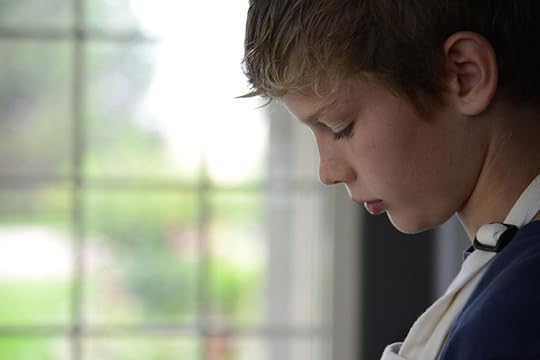










It’s easy to wrongly assign it to the category of pleasant childhood diversions that will pass in time as their children grow into young adulthood. But children’s developing imaginations need to be properly fed in order to grow into mature imaginations that can anchor the deepest, most meaningful concepts in Scripture.
A faith that is uninformed or uninspired by the images, metaphors, symbols, and stories of God’s Word is in danger of becoming unimaginative and unanchored, weakened by an overreliance on reason, adrift on a shallow sea of facts and propositions.
God imagined the entirety of creation in eternity past before He ever spoke the first “Let there be . . .” of His epic story, creating every micro and macro part of His infinitely complex, undeniably beautiful and “good” creation.
He left His signature on His work in the imago Dei that’s written indelibly on our souls. We dare not fail to respect the power of His imagination in us or our children.
Imagination is important for our children for one overriding reason—it is the faculty by which they will believe.
It’s easy to make the mistake of thinking that imagination, like inspiration, is a kind of passive mental state.
Rather, it is more like a muscle that will become stronger or weaker depending on how it is fed, exercised, and used.
Christian author Caryn Rivadeneira makes the faith connection: “Without imagination—without the ability to picture what is unseen, to believe what is unknown—how can we have faith? Without imagination, without the ability to imagine a ‘preferred future,’ how can we hope? Without imagination, how can we experience the majesty and wonder and nearness of a mysterious God?”
The world says, “You’ve got to see it to believe it,” but biblical belief turns that on its head, saying, “You’ve got to believe it to see it.”
In other words, there is a kind of seeing that starts with belief: “Now faith is the assurance of things hoped for, the conviction of things not seen” (Hebrews 11:1; emphasis added). The author of Hebrews asserts that the “conviction” of faith, or belief, enables us to see the “not seen” things of God.
Similarly, Paul prays that God will give the Ephesians spiritual eyes—eyes of the heart—to see all that He has done for us as believers: “I pray that the eyes of your heart may be enlightened, so that you will know what is the hope of His calling, what are the riches of the glory of His inheritance in the saints, and what is the surpassing greatness of His power toward us who believe” (Ephesians 1:18-19, emphasis added; see also 1 Corinthians 2:6-13).
If you want your children to “see” all the unseen ways God tells us He blesses His children now and in eternity, a well-formed Christian imagination is the starting place.
Henry David Thoreau, a nineteenth-century author, naturalist, and poet, said, “It’s not what you look at that matters, it’s what you see.”
Two people can look at the same pretty flower and “see” different things—one a pleasant happenstance of nature, the other a beautiful piece of artwork by the Creator.
The difference is imagination.
When you form your children’s imaginations, you are training them to see more than just what is there—to look at the world, nature, people, and even daily life with the same eyes of the heart that God gives us to see His redemptive work in eternity.
The apostle Paul exhorted, “Set your mind on the things above, not on the things that are on earth” (Colossians 3:2). He commands us to be “minded” about the things above that we can see only with eyes of the heart, not the things below that we see with the eyes in our head.
Forming your children’s imaginations—opening the eyes of the hearts—is a distinctly lifegiving part of your parenting that connects your children with the life of God in your home.
To obey Paul’s command for your children means giving them more than a rational faith—it means also giving them a well-formed Christian imagination that can look at a starry night sky and see more than the infinite reach of empty space and the eternal stretch of endless time, that can “keep seeking the things above, where Christ is, seated at the right hand of God” (3:1).
You are giving your children eyes to see and believe.
Forming your children’s imaginations—opening the eyes of the hearts—is a distinctly lifegiving part of your parenting that connects your children with the life of God in your home.
You are putting them in touch with the image of God within them, which connects them with the living God who put it there.
A well-formed imagination is a bridge to an expanded understanding of life that can shape and influence everything your children will become by faith.
So, use your imagination, and theirs, to build that bridge.
Clay and Sally Clarkson have been giving parents help and hope for over three decades, mostly through Whole Heart Ministries, the Christian home and parenting ministry they began in 1994. Clay, a graduate of Denver Seminary, has written books on biblical and practical parenting, including Our 24 Family Ways and Heartfelt Discipline. Sally’s extensive ministry has influenced countless mothers through 22 years of conferences, Mom Heart groups, her blog and podcast, and now her LifewithSally.com membership site. Her nearly 20 books, including The Mission of Motherhood, Desperate, and The Lifegiving Home, encourage mothers around the world.
In The Lifegiving Parent: Giving Your Child a Life Worth Living for Christ, Clay and Sally explore eight key principles—heartbeats of lifegiving parenting—for creating a home where children experience the living God alive in their family. Through biblical insight and personal family stories, the Clarksons provide understanding, wisdom, and tools to equip parents to give their children not just a good Christian life, but the life of Christ.
[ Our humble thanks to Tyndale for their partnership in today’s devotion ]

April 28, 2018
Only the Good Stuff: Multivitamins for Your Weekend [04.28.18]
Happy, happy, happy weekend!
Some real, down in the bones JOY to celebrate today! Links & stories this week 100% guaranteed to make you smile a mile wide & believe like crazy in a Good God redeeming everything — and that there’s love everywhere & for ((you))!
Serving up only the Good Stuff for you right here:
Dirk Dallas via FromWhereIDrone.com
Dirk Dallas via FromWhereIDrone.com
Dirk Dallas via FromWhereIDrone.com
kinda never get over the whole extraordinary earth being full of His glory
serving up some of the most creative coffee you may see in a while?
Chris Leone
Chris Leone
Chris Leone
anyone else want one? sharing the wonder right here
cheering wildly: because we all need to slow down and enjoy the moments
she’s weaving her art into the fabric of cities in big ways
good words here… The Wall Between You and God’s Will
doing great things: come meet 2 women doing incredible things to preserve the seas
smiling through tears at this: Elderly man calls police for ride to visit wife in hospital
The chief says “it’s a small town so you try to help out when you can.”
can you even?!? first-time mother at the Smithsonian Zoo who couldn’t stop kissing her newborn right after she gave birth.
The Mistake I Made With My Grieving Friend
heart fireworks: anyone else want her ‘title’?!?
the records he’s setting? not your typical 13 year old
they’re sharing some of their 49 years of marriage wisdom
kinda undone here: Paralyzed Groom Marries ‘Dream’ Girl and Takes In Five Foster Children
he insists he’s not a hero – but his brave response saved many lives
first impressions never really tell the whole story
this is just so so beautiful in so many ways:
giving single moms a helping in to pursue their college dreams in a most unique way
Post of the week from these parts here
How to Live Through Hard Things?
love her and the way she serves: Raising World Changers in a Changing World
a courageous story of heartache…and so much hope
Want the gift of light breaking into all the broken places, into all the places that feel kinda abandoned?
These pages are for you. It’s possible — abundant joy is always possible, especially for you.
Break free with the tender beauty of The Broken Way & Be The Gift …
And if you grab a copy of Be The Gift? We will immediately email you a link to a FREE gift of THE WHOLE 12 MONTH *Intentional* Acts of Givenness #BeTheGIFT Calendar to download and print from home or at your local print shop! Just let us know that you ordered Be The Gift over here.
You only get one life to love well.
Pick up Be The Gift & live the life you’ve longed to
good, good words from Priscilla Shirer: Do. Not. Be. Afraid.
on repeat this week: Make me your vessel, make me an offering
…so you may be wondering, how do you live through this hard thing — that’s effecting everything? How do you keep taking one step after another — when you just want to be on another road altogether?
I do get it — sometimes it’s not even about battling to win, or about battling forward. It’s about battling to breathe. Everyone’s fighting a hard battle that they’re losing — and winning is staying in the battle. You’re winning the battle — when you stay in the battle. The battle you have ahead of you is won — if you just keep your heart in the battle now.
And the truth about every blasted battle is: What feels hopeless — is where you meet more Jesus.
Breathe this in and know: All darkness has shores and there is always laughter on the other side. You have to believe this.
And when it comes — there is this catching of breath:
Nothing is ever too far gone for hope to come find you.
[excerpted from our little Facebook family … come join us each day?]
That’s all for this weekend, friends.
Go slow. Be God-struck. Grant grace. Live Truth.
Give Thanks. Love well. Re – joy, re- joy, ‘re- joys’ again
Share Whatever Is Good.

April 27, 2018
How to Be a Better Mom {hint: It’s not what you’d think…}
As a mama of seven – a lose-library-books, holes-in-the-toes-of-socks gaggle of kids – I have sought many a time to be better at motherhood. After all kinds of bumps in the road, messes that stayed behind for days, and the pain of watching my kids go through heartache, there were times I thought it just wasn’t possible. Then I found a kindred spirit in Ruth Schwenk. Her story runs parallel to mine, and hers is a life-giving friendship. And her words in The Better Mom– they speak deeply to the soul, allow me to let a breath out: one “me too” at a time. It’s a grace to welcome Ruth to the farm’s front porch today…
Her arms swung around me, clutching to my neck. Leaning in close, almost nose to nose, she declared, “You’re the best mommy in the whole world!”
My heart melted like it usually does when my five-year-old makes such statements.
What mom doesn’t love to hear her child declare such love?
It had been a very stressful season in my life, and I wasn’t the mom I had been for the last ten years.
I breathed a deep sigh and whispered, “Mom loves you sooooo much!” “Me love you too,” she hoarsely whispered back.
I have these exchanges quite often with my children. But this particular time, I had something else going on inside of me as my daughter so boldly declared her devotion.
I had a heaviness on my heart that she was completely unaware of. What she didn’t know is that deep down I wasn’t feeling like “the best mommy in the whole world.” Instead, I felt like a mess.
A big mess.
It had been a very stressful season in my life, and I wasn’t the mom I had been for the last ten years.
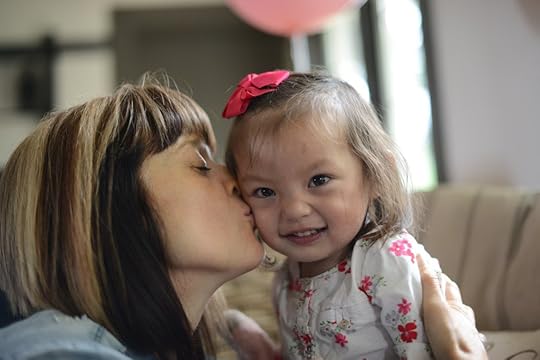








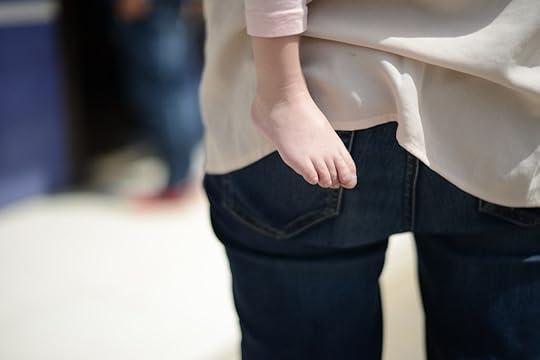
After suddenly losing my father-in-law to a tragic car accident and my mother-in-law just two years later, all in the midst of leaving the church my husband had been on staff at for ten years to move to a new church in a new town with new friends, I had let my overwhelming circumstances crowd my heart and mind.
Magnifying my personal state, through all of this I had let the nagging voices of doubt fill my head, and I began to question whether I was a good mom at all.
I was tired, worn out and struggling to keep it all together. I was fully aware that I needed to make a change. What I had to come to grips with was glaringly obvious. That change needed to begin with me.
I don’t know how reality may have shattered your dreams and expectations for being a mom, but the truth is, momming is very different from what most of us expect it to be.
Who has visions of staying up at night with a sick child? Or dreams of washing and folding what feels like endless loads of laundry? Our dreams of family nights, game times, and meaningful conversations are quickly swallowed up by the mundane and even painful aspects of parenting.
We usually don’t start out by being in over our heads, but we can quickly get there. We might be in tough circumstances, but we certainly are in good company when we feel in over our heads.
God is inviting us not to do more, but become more.
I can’t help but think of some of the difficulties the people of God faced when He called them to fulfill His purposes.
Abraham left his tribal homeland.
Moses led Israel out of slavery in Egypt.
Esther saved a nation by asking favors of a king who held her life—and the lives of her people—in his hands.
Nehemiah left a palace to restore a city in ruins.
Noah confronted a corrupt city.
All of it was hard, risky, sacrificial work. But it was the type of work that matters.
In every example, God was doing a good work. He was changing lives, redirecting generations, altering outcomes, and restoring what had been destroyed.
It was hard work because it mattered.
God was accomplishing His purposes, pushing back darkness with His shining light.
the mess is where God wants to meet us. Not to stay there, but to grow there.
What I love about each of these stories is not just what God did with these faithful acts of obedience.
I love that in every story, the men and women involved were not just used by God, they were forever changed by God. God had given them more than they could handle, but He didn’t ask them to handle it alone.
So what if being a mom who seriously wonders how she can handle the mess that is on her plate is exactly where God wants you to be?
What if the worn out, scared, exhausted, I-can’t-do- this feelings are exactly the place where real transformation begins?
What if that is where God wants you to be, but not where He wants you to stay?
What if the challenges of being a good mom is God’s way of getting your attention so you can focus on being a better mom—God’s way?
The work of momming is a high calling. It’s full of goodness, adventure, fun, hard work, and sacrifice. Yes, it’s messy. Unpredictable. And at times, overwhelming.
But the mess is where God wants to meet us. Not to stay there, but to grow there.
God is inviting us not to do more, but become more. There is a better way—a way that is more than just feeling tired, overwhelmed, stressed, and ready for it all to be over.
God wants something more for us. He has something more.
The way to becoming a better mom starts not with what we are doing, but in asking who God is inviting us to become.
When we signed up to become mothers, we thought we were going to get baby giggles and snuggly bedtimes and cozy family dinners.
Then we got colicky babies, bedtime battles, and five o’clock “arsenic hour.”
But on top of all those things, we got more—so much more.
More grace. More growth. More love.
We soon discover that just as God is using us to grow our children — God is using motherhood to grow us.
Ruth Schwenk is the founder of The Better Mom, and along with her husband, the creator of For the Family. She is a pastor’s wife, mom of four energetic kids, a lover of coffee, and dreamer of big dreams. A graduate of Moody Bible Institute, Ruth is the author of The Better Mom and the coauthor of Hoodwinked and Pressing Pause. Ruth and her husband, Patrick, are the coauthors of For Better or for Kids. Ruth and Patrick have been in full-time church ministry for over fifteen years, and live in Ann Arbor, Michigan.
Ruth’s newly-released book, The Better Mom: Growing in Grace between Perfection and the Mess, calls moms to embrace the work of the Holy Spirit inside our (often weary) souls. At the heart of The Better Mom is the message that we, as mothers, don’t have to settle for being apathetic or struggle to be perfect; that instead, God is inviting us to meet Him in between and let Him do His work in us.
[ Our humble thanks to Zondervan for their partnership in today’s devotion ]

April 24, 2018
How to Live Through Hard Things?
W
hen the woman reached out to hug me just before I got to the door, she whispered it in my ear and I barely heard it through what was leaking down her cheeks, “I don’t know if I’m going to live through this.”
She pulled back and looked me in the eye:
“Maybe it’s — I just don’t know how — to live through this?”
How do you keep taking one step after another — when you want to be on another road?
I read her eyes and she reads mine and how do you hear the voice of the Shepherd still calling your name when the lies from the pit keep calling you names, and you can’t breathe for the shame?
How do you live through this hard thing — that’s effecting everything? How do you keep finding a way forward — without losing your hope along the way?
How do you keep taking one step after another — when you want to be on another road?





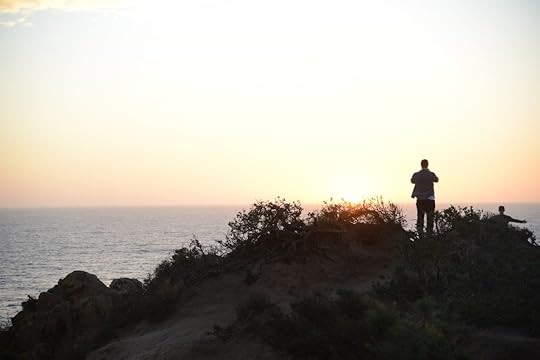
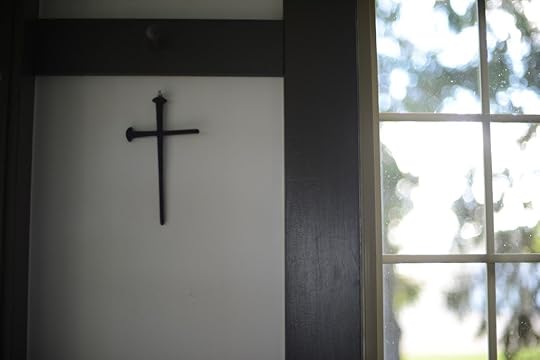

The woman brushes her cheeks with the back of her hand.
And I don’t know what grief that’s got her cornered at every turn, or if it’s a prodigal child she’s begging to make a u-turn, don’t know if it’s a mountain she’s got to take, or if it’s something that’s trying to take her — but I know that I know that overwhelmed look in her eyes and I feel the cracking ache in her brave voice and the details of our hard may be different, but all our need for courage is the same.
The scale doesn’t move a digit, but your determination doesn’t budge an inch.
The acceptance letter doesn’t come in the mail, but you don’t accept that this any dead end.
The job offer doesn’t come through, but you don’t offer to back down from life one iota.
The knot in your gut that was there last night, is right there strangling you a bit tighter as soon as you open your eyes this morning, but you grab hold of that rope and you just tie it to the next thing and the next thing and you make that knot in your gut into a knotted lifeline from one moment to the next.
And I cup her face in my hands. And I nod, because I feel it too:
Everyone is fighting a hard battle — but there are a lot of us fighting hard battles after losing a whole string of other battles.
It’s one thing to be fighting a hard battle — and it’s another thing to be fighting a hard battle — when you’ve already lost a lot of battles, when you’ve lost the biggest battles, when you have to keep fighting this battle even though you are clearly losing this battle and you will have to keep fighting this losing battle today and tomorrow and the next day.
Life is one hard battle — and there’s no walking off that battlefield, no escaping from that battlefield, no way out of this battlefield called life.
You have to show up, and not give up.
You have to find a way, and not walk away.
You have to keep hanging on, when you don’t know how to go on.
You can’t lose hope — because you have to keep breathing hope.
Sometimes it’s not even about battling to win, or about battling forward. It’s about battling to breathe.
I look her in the eye and only want to tell her:
Everyone’s fighting a hard battle that they’re losing — and winning is staying in the battle.
You’re winning the battle — when you stay in the battle.
And I tell her that I’m with her, with her, and I nod and I mean it.
The battle you have ahead of you is won — if you just keep your heart in the battle now.
And she nods and squeezes my hand.
Because what we all need in our battles is with-ness and witness.
Brokenness needs with-ness and witness — someone to stand with us and someone to see us.
And she smiles the bravest and I whisper, “You will live through this.”
Because the truth about every blasted battle is:
What you don’t know how to live through — Jesus died for.
Where you don’t how to go on — Jesus already went through.
What feels hopeless — is where you meet more Jesus.
And that’s what ended up following me all the winding way home under a smattering of spring stars. What they call the dark night of the soul may feel as endlessly black as the limitless cosmos — but darkness isn’t God, darkness isn’t infinite. Darkness has limits, darkness has an end, darkness has borders.
And sometimes you exhale like the expanse of a night sky, like even your breath calls your Father’s name, YWHW.
And you breathe: All darkness has shores and there is always laughter on the other side. You have to believe this.
And when you can’t believe— just breathe. Next breath, next thing, next step — and will get you through now.
He knew: He made your every breath to be the sound of His name, the endless song that comforts your only soul.
Just before dawn this past week, we wake early to stand in the dark and witness the Lyrids, part of the comet Thatcher, shower across the night sky. We have to wait in the dark, wait for our eyes to adjust to the pitch black, wait to see the cascading light.
And when it comes — there is this catching of breath:
Nothing is ever too far gone for hope to come find you.
And we watch how the meteors live through the dark and win the night and on the other side, there’s the rising dawn.

April 23, 2018
How to stay kind when the world throws you chaos
Candace Bure Cameron knows the refreshing secret to the good life: Now more than ever we all need to be kind to one another. The world needs us to belong to each other, to hear each other, to hurt with each other, to be kind to one another. No one ever killed anyone with kindness —- only the dark is killed by kindness. The rest of us are resurrected by kindness. I met Candace one quiet evening about two year ago, and quickly realized that well she may be well known for Full House or Fuller House – or her many other shows, movies or books she’s written…what is so striking about her, is how she lives as the daughter of Jesus Christ. Candace writes with a refreshing air of Christ-breathed humility. Hers is a message of transforming clashing cultural expectations into Savior-imitating kindness, one act at a time, and it’s a powerful one. It’s a grace to welcome Candace Cameron Bure to the farm’s front porch today…
guest post by Candace Cameron Bure
People sometimes ask me, “How do you not lose it when you’re being attacked and criticized?”
I got that question a lot when I was on The View, and I get it now whenever the media is dismissive of me in light of my faith or political views.
Fans or viewers tell me they feel like fighting on my behalf, which I completely understand.
When you have a direct line to the Creator of the universe, you don’t feel as intimidated by worldly things.
What they really want to know is, how can I stay cool, calm, and collected when people are unkind to me?
Here’s the truth. I don’t always feel calm. Rather I’m mindful of my purpose—to glorify God in all I do.
And that gives me an anchor.
My deep desire is to extend to others just some of the grace constantly extended to me through Jesus Christ.
My faith gives me presence of mind in those moments, and my prayer life gives me strength.
When you have a direct line to the Creator of the universe, you don’t feel as intimidated by worldly things. I can talk to God about anything, and He answers.
Not always the way I want Him to or in the timeline I hope for, but He always answers.










Having been in this business a long time, I’ve developed five secret tools that I use regularly to stay cool.
We all face criticism and conflict, and we all need to know how to handle it with grace.
Here are five methods I’ve learned along the way.
1. Take Deep Breaths
When conflict comes, I take slow, measured breaths—counting to three as I inhale, then counting to three as I exhale.
Do this a few times, and it’s like a mental reset. It’s easy to want to rush to act, but a few breaths work wonders for the body and soul. Breathing helps me quiet the other voices so I can hear God speaking peace and assurance.
God’s supernatural peace is promised to all believers. Philippians 4:7 makes this comforting promise: “The peace of God, which transcends all understanding, will guard your hearts and your minds in Christ Jesus.”
God’s peace is available to me, and it will guard my heart and mind in a conflict.
When my emotions start to surge, I need a breath or two to remind me of this truth. Sometimes a few breaths is all it takes.
2. Take a Beat
I borrowed this from my acting career. Taking a beat means sitting still for a moment to let the previous line or joke sink in.
I often count quietly to myself. This does not always come easily.
It’s a discipline I’ve learned over time.
But when I put it into practice, I always feel more in control, which makes everything much easier.
I’ve found that when I take a beat, I can smile after a few breaths. I’m not talking about a pasted-on smile. I’m not ignoring the situation in front of me.
But taking a breath and then taking a beat helps me tap into a peace that pervades the rocky moments. I’ve experienced that peace more times than I can count.
3. Switch Roles
After I breathe and take a beat to remember who (or whose!) I am, I mentally switch sides, trying to think about the other person’s perspective.
Most often when I do this, I discover that the other person’s words or behavior reveals fear, pain, sadness, or discomfort.
Here’s the truth. I don’t always feel calm. Rather I’m mindful of my purpose—to glorify God in all I do.
When I see the vulnerable person behind the fuss, compassion comes naturally.
This is one way my belief that all people are made in the image of God plays out practically. We each have God-given value and God-given emotions.
When I remember that my opponent in a conflict is an image bearer, empathy always rises to the surface in my heart.
4. Go to God First
Sometimes I need to sit with my emotional response for a while. I need to name my feelings (“I’m feeling defensive” or “What they said about me hurt because I worked so hard”).
I don’t try to fight how I feel, because emotions aren’t right or wrong; they are value neutral. It’s how we behave that is right or wrong.
The Bible says, “Be angry, and do not sin” (Eph. 4:26 NKJV). In other words, feel what you’re feeling, but don’t hurt others with your words or actions. When we seek the best for everyone, a win-winis possible.
So sometimes I count to ten, say a quick prayer, and then act. Other times I may need to sleep on it before I can act.
But whatever the case, I pray.
God’s Word says, “Be anxious for nothing, but in everything by prayer and supplication, with thanksgiving, let your requests be made known to God; and the peace of God, which surpasses all understanding, will guard your hearts and minds through Christ Jesus” (Phil. 4:6–7 NKJV).
What is the antidote to anxiety? Thankful prayer.
That means I should be grateful for the person and the circumstance.
After all, God allowed this moment into my life for a reason, whether for discipline or for blessing, or maybe so I could be a blessing to someone else.
Honestly, I don’t usually know why, but I believe that He is a good Father and that He has control. So I need to thank Him for all those things and trust. Prayer is how I do that best.
5. Ask for What You Want
Here’s the hardest part of conflict for me: asking for what I want.
It’s my job to give voice to my needs and concerns. It’s nobody else’s job but mine.
That’s been a hard lesson for me. I could have saved myself a lot of heartache if I had learned it sooner!
Women especially seem to have a hard time with this one. Culturally, many of us have been trained not to speak up for what we want. But frankly, if we don’t, who will? It’s foolish—actually ridiculous—to complain about not having what you want if you don’t speak up for yourself and ask.
I’m not talking about demanding what we want or making requests in ways that are angry and entitled.
But it has helped me tremendously to realize that I am the one who must give voice to what I need.
Rather than simply venting my emotions or cataloging my complaint, I try to cut to the chase in a conflict and calmly, respectfully ask for what I want.
Here’s an amazing truth I never thought I’d write. I’ve learned that sometimes I have to create conflict when my impulse is to keep my mouth closed for the sake of peace.
It’s my job to stand my ground sometimes.
It’s your job to stand your ground sometimes too.
The challenge is to do it with elegance and conviction.
To keep it classy by keeping it kind, no matter what conflict comes our way.
Candace Cameron Bure is an actress, producer, and New York Times bestselling author, beloved by millions worldwide from her role as D.J. Tanner on the iconic family sitcoms Full House and Fuller House. She is both outspoken and passionate about her family and faith and continues to flourish in the entertainment industry as a role model to women of all ages. She lives in the Los Angeles area with her husband and three children.
Candace’s newly-released book, Kind is the New Classy: The Power of Living Graciously, reveals the thought patterns and practices that have empowered her to flourish with grace, integrity, and excellence. If you’re a woman struggling to stay true to who God has created you to be in today’s push-shove world, this is a read for you.
Read with joy: You will be holding a kind of resurrection in your hands. The secret is kindness: it’s classy, unexpected, even counter-cultural, and ultimately wins the day.
[ Our humble thanks to Zondervan for their partnership in today’s devotion ]

Ann Voskamp's Blog
- Ann Voskamp's profile
- 1369 followers


